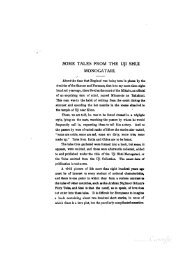Create successful ePaper yourself
Turn your PDF publications into a flip-book with our unique Google optimized e-Paper software.
"His son was very unfortunate," says Arai, "and cut down<br />
the allowance <strong>of</strong> his samurai, and many left his service. I<br />
was not in confidential relations with him or his father but<br />
would not leave at such a time, for if one has enough for<br />
oneself and family such desertions are not loyal even<br />
though the service be unsatisfactory. It is natural that a<br />
samurai should be poor, yet he must maintain his station,<br />
but finally my funds gave out."<br />
And he left. Now Arai had originally been a vassal <strong>of</strong><br />
Tsuchiya, Lord <strong>of</strong> Kururi in Kadzusa. After a short time as a<br />
rōnin he became a vassal <strong>of</strong> the Hotta family. After another<br />
brief space as a lordless man he entered the service <strong>of</strong> the<br />
Daimyō <strong>of</strong> Kōfu, who presently became the Shōgun,<br />
Iyenobu. Thus, Arai had at least three different lords, and he<br />
would readily have taken service under a fourth, if<br />
Yoshimune had seen fit to utilize his talents. In Japan, no<br />
less than in feudal China, the high-sounding precept that "a<br />
faithful vassal should not serve two lords" was formally<br />
endorsed and approved. But when it came to the plain<br />
prose <strong>of</strong> practice,<br />
[Page 232]<br />
Arai's case is by no means the only contemporary one,<br />
which seems to indicate that the maxim was taken as a<br />
counsel <strong>of</strong> perfection. It might serve very well as a copybook<br />
head-line, but, in the ordering <strong>of</strong> his life, the samurai

















